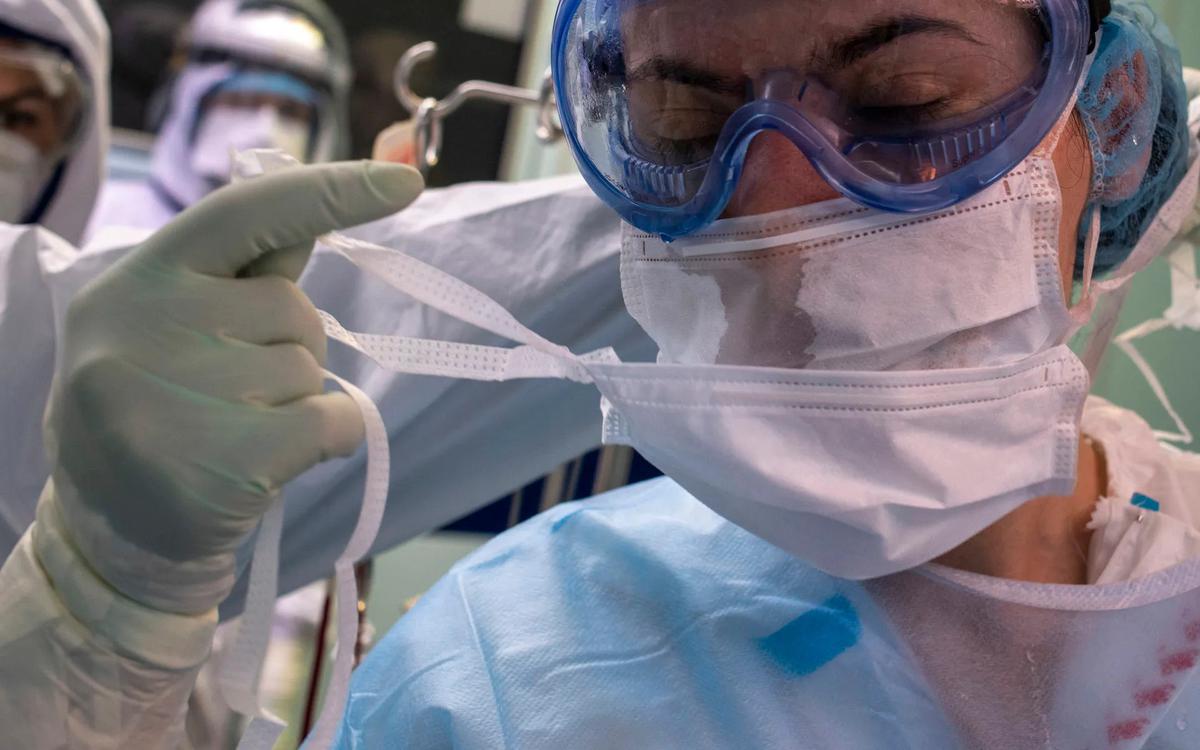This Week’s Highlights
Kremlin’s COVID-austerity pushes the first Russian region into bankruptcy as experts warn that many more are to follow; why the leader of a tiny Russian region has the power and resources to bully and threaten France, and what’s Putin’s role in all of this; plus, Russian doctors have been fighting one of the world’s worst Covid-19 outbreaks for over nine months — they tell us how their lives have been altered forever.
Want to get the full story? Click the links below for full-length articles in Russian.
Kremlin’s Austerity, Explained
While most countries throw unprecedented amounts of money to support their pandemic-stricken economies, the Russian government is obsessed with austerity. As millions of Russian saw their jobs erased by the Great Shutdown and their incomes plunged, the Kremlin kept saying 'nyet' to anti-crisis bailouts and pushed Russians to borrow more. Now the provincial economies start to collapse. This week we explain what this means and what region will come next. Spoiler: there will be plenty in the coming months.
THE FIRST REGIONAL VICTIM OF KREMLIN'S AUSTERITY. Ingushetia will soon become the first Russian region to go bankrupt during the coronavirus pandemic. The tiny autonomous republic in Southern Russia is now required to transfer all control over financial policy to the federal government. Ingushetia's public debt ballooned by around 64% in 2020 and now stands at almost 125% of planned annual budget revenue. This is the first time in modern Russian history that a region has declared bankruptcy.
THE MISHANDLED CORONAVIRUS CATASTROPHE DAMAGES THE RUSSIAN ECONOMY.The pandemic and the resulting economic shutdowns are expected to open up a hole in Russian regional budgets of about 830 billion rubles (over $10 billion) in 2020, Gazprombank analysts predict. Despite the dire situation, the Kremlin actually plans to decrease federal budget transfers six-fold next year. As a result, almost all regions will need to plug holes in their budgets with new bank loans. The World Bank predicts that Russia's GDP could contract by as much as 6 percent in 2020, an 11-year low and that it probably won't catch up to pre-pandemic levels for the next few years.
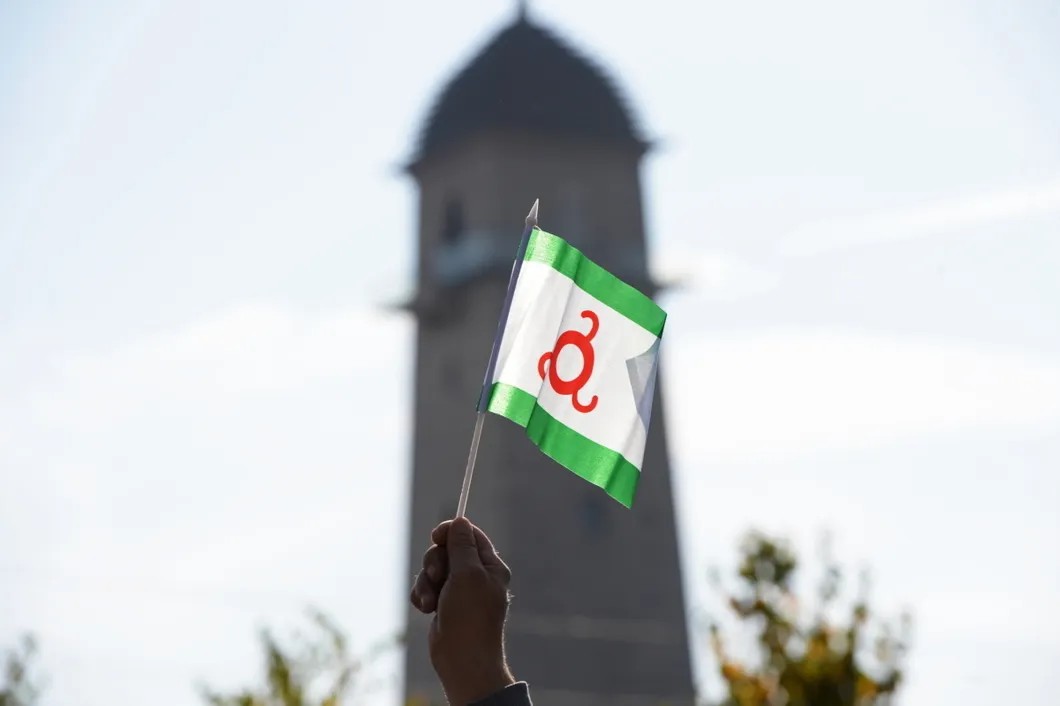
BUT PUTIN IS TRANSFIXED ON COVID AUSTERITY.For years, Russia has been using fiscal austerity measures to squirrel away hundreds of millions of dollars in a rainy day fund. Given the coronavirus pandemic and consequent hit to the economy, one would think that the rainy day had arrived. But President Putin has refused to dip into the funds and instead insisted on doubling down on his fiscal conservatism against his own close economic advisers' advice.
WHY? Russia managed to stave off the worst impact of the coronavirus recession in large part due to its dependence on the sale of commodities like oil, gas, steel, and coal. But Putin might feel like the government cannot afford anti-crisis social spending due to increasing international pushback against Russia's problematic geopolitical choices. The Kremlin is just hedging for more international sanctions and financial isolation in the coming years — at the expense of Russian families' wellbeing that would greatly benefit from those rainy day funds.
MORE ECONOMIC PAIN TO COME.Russia's significant budget deficits may mean that authorities may soon implement bankruptcy mechanisms in other regions that are in a difficult financial situation. Some of the most likely candidates for future bankruptcies are Mordovia, Pskov, Oryol, Smolensk, and Kurgan. Transfers from the federal budget will not be enough to fill all the gaps in these regions' budgets.
Read our full report on Ingushetia’s bankruptcy here.
Kadyrov’s Long Shadow over Europe, Explained
The beheading of a teacher in France by a Chechen extremist brought into focus the bizarrely outsized influence of a tiny Southern Russian region over the country's foreign affairs. Especially after Chechen leader Ramzan Kadyrov accused French President Emmanuel Macron of behaving 'like a terrorist.' So why would a Russian provincial strongman feel cocky enough to harass and insult an EU leader?
KADYROV vs. FRANCE.Just in case if you haven't been following the story, after the assassination of a French teacher for showing his students a cartoon of the prophet Muhammad, French President Emmanuel Macron stood behind the decision of the victim and defended the right to self-expression and freedom of thought. Kadyrov attacked Macron on social media. "If you call [the murderer] a terrorist, then you Macron are 100 times worse because you're inducing terrorism," Kadyrov wrote. "You can safely call yourself the leader and mastermind of terrorism in your country."
KREMLIN GETS IRRITATED BY INCREASINGLY COCKY KADYROV.After the abrasive comments, the Kremlin felt like Kadyrov was stepping on their toes by crafting his own foreign policy and speaking out of turn. Putin's press secretary Dmitry Peskov publicly warned Kadyrov that he had gone too far by reminding the Chechen leader that Russian foreign policy is determined by the Kremlin and not by Russian provincial leaders.
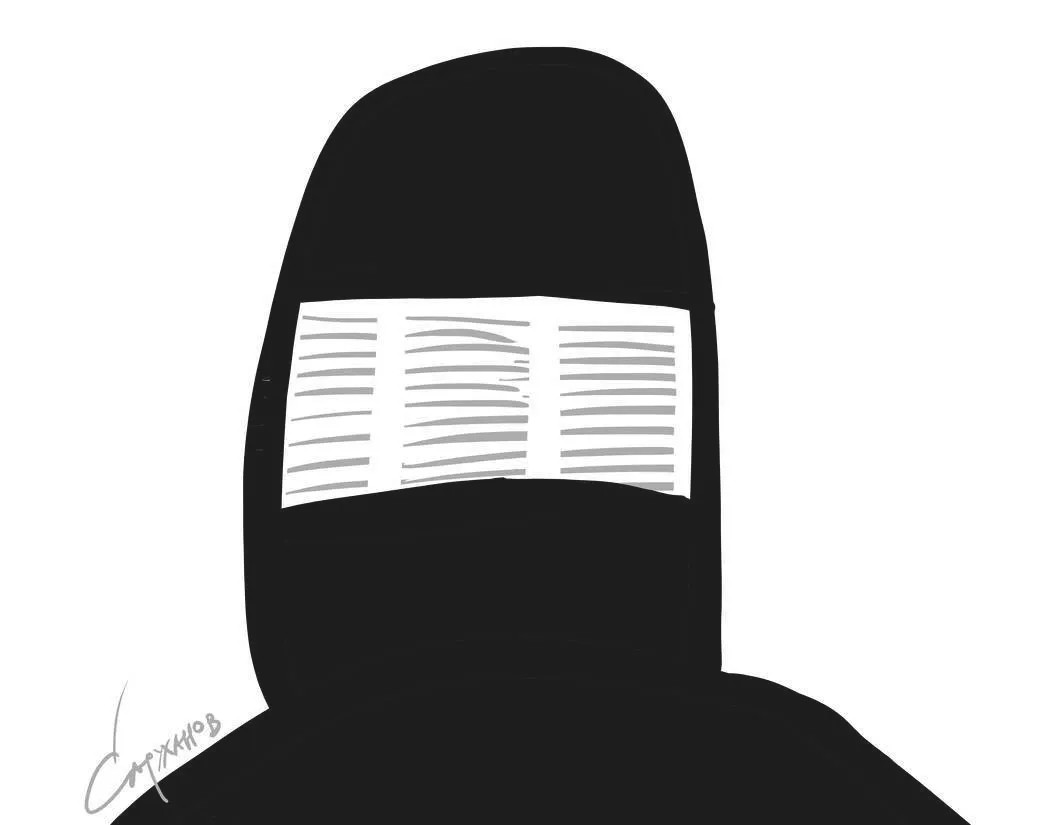
KADYROV SNAPS BACK.The Chechen leader immediately shot back at Peskov, arguing that he commented about Macron as a Muslim and not in his capacity as a political leader. The comments are noteworthy because none of the other 84 leaders of Russia's regions would dare speak to the Kremlin in such an acerbic tone. But in reality, Kadyrov's shadow over Europe is much longer and darker than Kremlin's.
KADYROV'S CRITICS GET MURDERED ALL OVER EUROPE. Chechen dissidents who run from Russia for their lives to Europe still risk getting murdered. In July this year, an outspoken blogger and Kadyrov critic Mamikhan Umarov was shot dead in Vienna. It was the fourth violent attack against a Chechen living in Europe in just one year. Before he died, Umarov compiled a list of all of the Chechens who were murdered in Europe after criticizing Kadyrov's regime. Additional attacks have taken place in countries like France, Germany, Poland, Sweden, and Ukraine. Chechen assassins roam freely within Europe's borders. Ask the most popular Chechen blogger and Kadyrov critic Tumso Abdurakhmanov who recently fended off a Chechen killer in his apartment in Warsaw while live-streaming the attack.
THEY ALSO GET ILLEGALLY DEPORTED BACK TO RUSSIA.Like many other tyrants worldwide, Kadyrov exploits the loopholes in international law enforcement, such as Interpol. Human rights lawyers point out dozens of cases every year when Russian asylum-seekers get deported from the EU back to Russia in violation of national and international law. The majority of them are Chechens, who face imminent torture or murder. One example is Khusen Gadamauri, a native of Chechnya who was extradited back to Russia from Germany in 2017 after the Kremlin guaranteed his safety. He was later killed in an alleged counterterrorism operation.
CHECHEN DISSIDENTS IN EU EXILE FACE REGULAR DEATH THREATS AND HARASSMENT. The recent wave of murders of prominent Kadyrov critics across Europe forced many dissidents to speak out. "They came to my sister, who is married and lives in Chechnya; she has nothing to do with me, but they began terrorizing her,' says Musa Lomaev, another prominent Chechen blogger in exile. 'I received a threat that after they deal with Umarov from Vienna, I'll be the next,' Lomaev adds. This September, Finish police arrested a man plotting Lomaev's assassination.
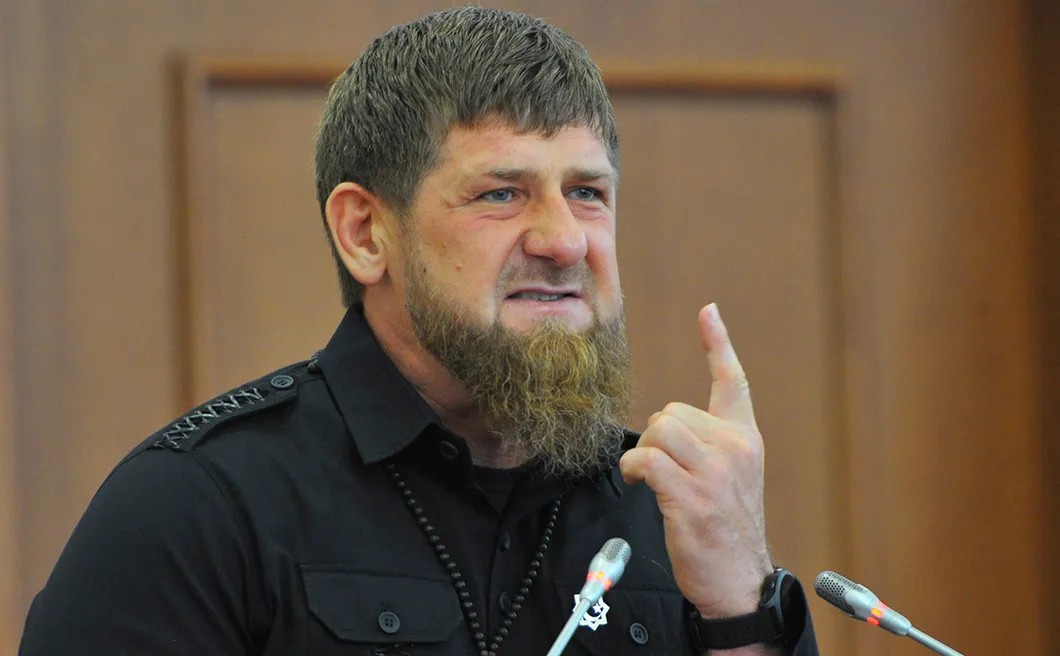
KADYROV HARNESSES SOCIAL MEDIA TO RADICALIZE EU YOUTH.The chechen ruler is prolific for his personal social media activity. Yet, recently the focus shifted to the attempts of the Chechen regime to use social media to radicalize Chechen youth living in the diaspora. One example is in France, where our partner outlet Caucasian Knot talked to the Chechen attacker's relatives and his community leaders. All of them suspect that the young man got radicalized online by messages coming from the Chechen propaganda. Many French Chechens are also afraid to denounce the violence perpetrated by their compatriots online, fearing harassment by Kadyrov's social media machine.
BACKSTORY.Chechnya is a small region in the South of Russia with just 1 million inhabitants. It failed to break away from Russia after the collapse of the Soviet Union and is now run by tyrannical semi-autonomous officials under the direct Kremlin patronage. Kadyrov, the region's top leader, rules Chechnya with brutality and bases much of his personality cult around his image as a devout Muslim. Overall, the voice of Russian Muslims gets louder in the rapidly changing demographic picture in the country. They are the fastest-growing demographic group and make around 10 percent of the population, with a larger concentration in Russia's biggest cities. By government estimates, every third Russian will be Muslim by 2035.
Read our full analysis of the way Kadyrov’s fight with France is affecting his relationship with Moscow here.
Untold Stories of Russia’s 9-month Covid-19 Struggle
This week we publish a special dispatch by our award-winning reporter Elena Kostyuchenko and photojournalist Yuri Kozyrev. As new infections hit record highs, the journalists spent several days at one of the Russian Covid-19 hospitals. Because the Russian government keeps downplaying the pandemic and disinformation is widespread, many Russians ignore necessary safety measures. That's why Kostyuchenko and Kozyrev had in mind to bring the story from Russian Covid frontlines that would make you want to put on your mask. And they've delivered.
'RED ZONES.'In Moscow's Hospital 15, around 225 new patients are admitted every day. Nearly the entire hospital is considered a so-called "red zone," where doctors fight to save Covid-19 patients on the verge of death. It's one of three hospitals in Moscow that has been operating since the beginning of the pandemic. Doctors' faces are nearly grey from spending so much time indoors. When Novaya Gazeta asked them if they needed medicine or equipment to help with their work, they said they need strength.
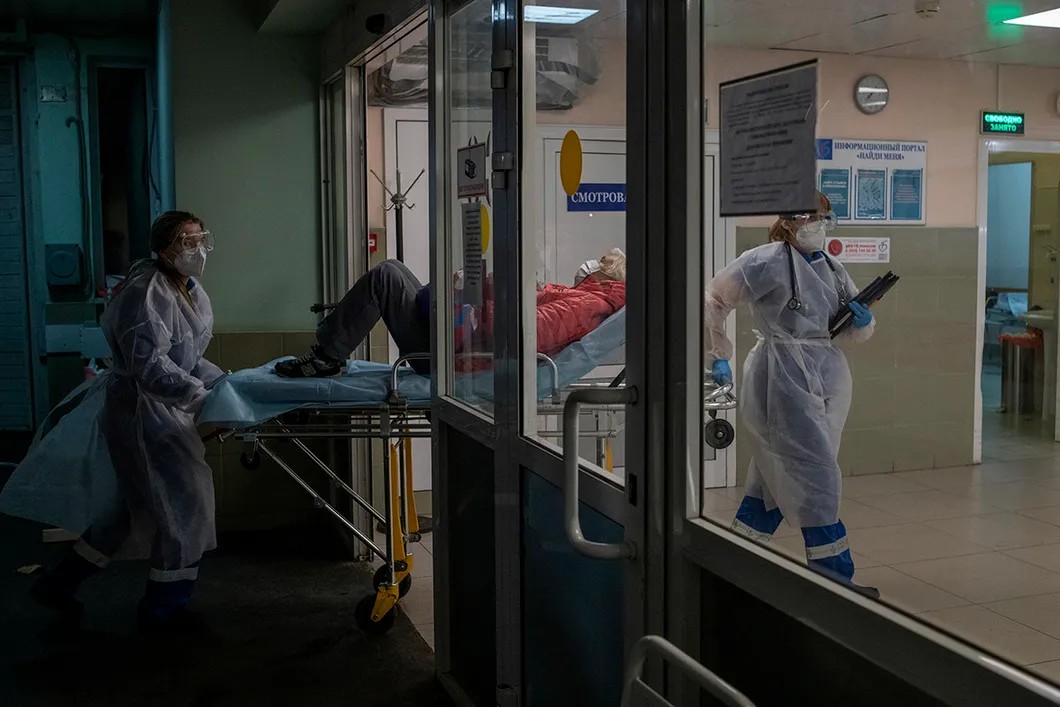
Here's what people inside the hospital had to say about how things have been going since the outbreak began:
'WE HAVE A MORTALITY RATE OF 90% IN OUR DEPARTMENT,tells us doctor Irina Kharlamova. 'I wanted to quit in August, but now I can't because we are experiencing another wave. I'll speak frankly. Patients over 80 years old with stage 3 or 4 pneumonia should not be admitted to the intensive care unit. That is how we do things during the war, and this is war,' says Kharlamova.
'FIRST, YOU ARE ADMITTED TO THE HOSPITAL, THEN YOU'RE BURIED, ADMITTED, BURIED … I have been working as a doctor for 19 years, and I have never made so many calls about death in my life,' tells us another doctor Natalya Neznamova.
'EVERYBODY HAS BLOOD CLOTS.The D-dimer test, which shows the body's likelihood of forming a clot, is normally 1 to 2,500 at most. Now we're seeing 1,000, 3,000, or 7,000,' explains another doctor Victor Anosov.
'NOW BABIES SHARE A BED WITH THEIR MOTHER IMMEDIATELY AFTER BIRTH. Visitors aren't allowed in, so the new mothers introduce the babies to their families via WhatsApp. Around 385 babies have been born here since the pandemic began,' Kostyuchenko writes.
RUSSIAN DOCTORS ON THE FRONTLINES OF COVID-19.Since the beginning of the outbreak, Novaya Gazeta has reported the doctors who are battling the illness in Russia's hospitals. We took our readers inside one of Moscow's first Covid-19' war zones,' and we profiled the doctors on the frontlines. Some doctors chose to wear diapers to avoid going to the bathroom during 12 or 24-hour shifts. They've been separated from their families. We also profiled some of the doctors who died from covid-19 after working to save their patients.
Read our report from inside a Covid-19 intensive care unit here.
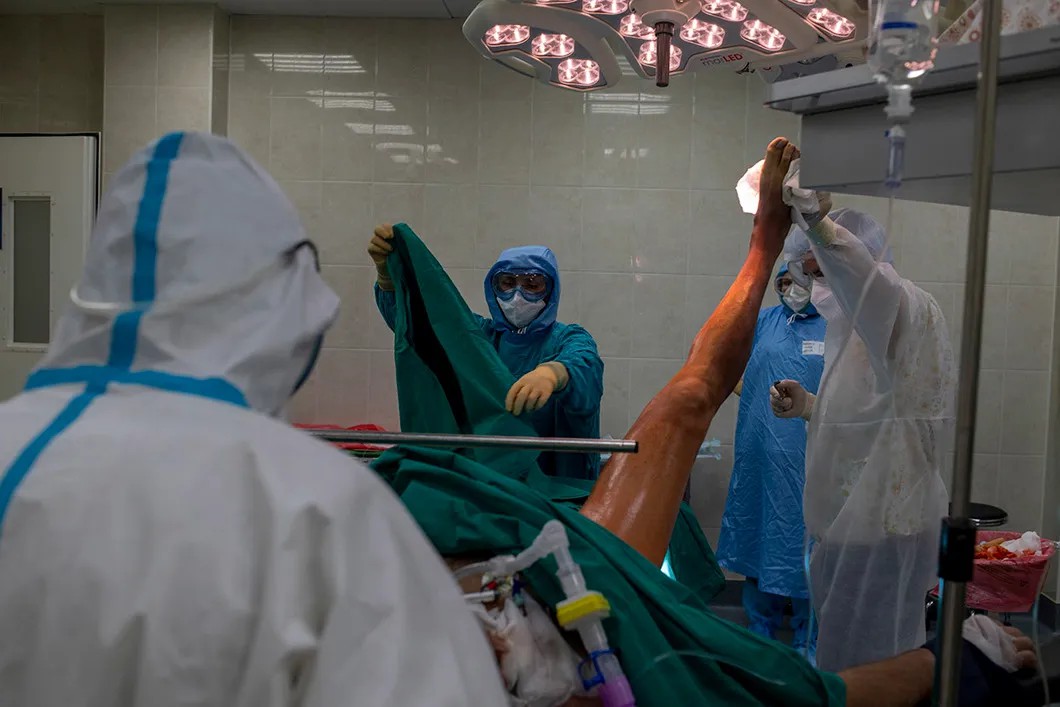
Other Top-Stories Russia Has Been Reading
- STRANDED RUSSIAN SOLDIERS. One of this week’s most-read stories is about dozens of Russian citizens who have found themselves stranded abroad with no legal recourse or way to get home. They are sailors on merchant ships that have been abandoned overseas and seized by local governments. They remain in limbo, living in unbearable conditions, often without access to money, adequate nutrition, or medical assistance. The situation has been exacerbated by the coronavirus pandemic, which has made it more difficult to cross borders. Our reporting suggests that there are hundreds of these sailors abandoned around the world.
- RUSSIANS AND THE US ELECTION.Another widely read piece was an op-ed by our columnist Kiril Martynov about the Russian response to the U.S. election. Despite what appears to be the world’s single-minded focus on the U.S. elections, Martynov argues that only a small minority of Russians, those who are already plugged into U.S. social networks, are really following the events. Ultimately, it’s unlikely the next U.S. president will make much difference to ordinary Russians. ‘Russians simply have no time for American democracy, Martynov writes. ‘If in today’s Russia you are seriously worried about the U.S. elections, then you belong to a privileged minority.’
Thanks for reading!To keep up with Novaya Gazeta’s reporting throughout the week, you can follow us on Facebook, Twitter, Instagram, and Telegram. Our video content is available on Youtube and don’t forget to visit our website for the latest stories in Russian.
— The Novaya Gazeta Team
